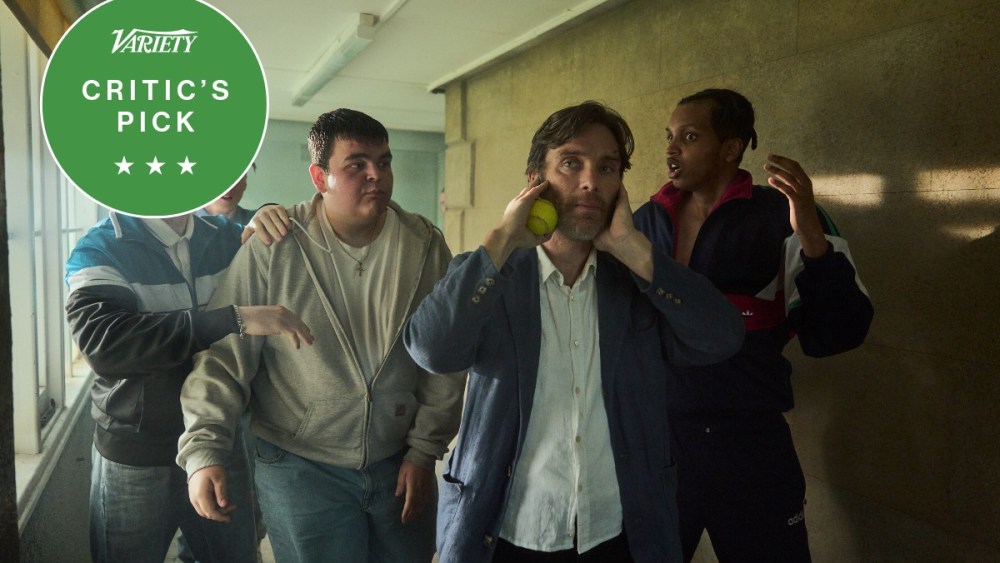Most schools have one or two problem students. At Stanton Wood, it’s nothing but.
Operated by the title character, “Steve” — into whom lead actor Cillian Murphy channels all sorts of irreconcilable conflict — this is the reform school of last resort. It’s the place “very disturbed young men” (as novelist Max Porter described them) are sent at great expense to the English taxpayers in the hope that the embattled institution’s small but dedicated staff of teachers and therapists can help the lads to manage their aggression and make something of themselves.
In theory, a film this strong should have premiered at Venice or Telluride, where it might have been noticed. Instead, “Steve” bows in the Toronto Film Festival’s Platform competition, where it’s apt to be overlooked amid more than 200 other movies — which could happen on Netflix, too. Instead of letting that happen, it must be said: A profoundly moving and superbly acted diamond in the rough, “Steve” is better than anything the streamer has pushed for best picture to date. Netflix famously uses the fall festivals to launch their awards contenders, but the company is playing this one close to the vest, putting it in theaters on Sept. 19, then releasing to the service on Oct. 3.
“Steve” represents a reunion of sorts between leading man Murphy, co-star Emily Watson and Belgian director Tim Mielants, who made last year’s wrenching Magdalene Laundries drama “Small Things Like These.” For this unrelated (but even more powerful) follow-up, Murphy personally encouraged Porter to adapt his novel, “Shy,” as a screenplay in which he might star.
Hence the title change. Where Shy was the subject of Porter’s slender book — which is really more of a Beat-poetry day-in-the-life monologue — the focus shifts here to the weary headmaster who’s been fighting on their behalf all these years. It’s 1996, and the government has pulled the plug. They’ve sold the school out from under Steve and his staff, who include psychiatrist Jenny (Watson) and tough-love Amanda (Tracey Ullman), who describes her job as part prison guard, part teacher, part mommy, part battle ax.
On the day in question, Steve has invited a documentary film crew inside the controversial institution (it’s expensive, and these underpaid heroes are practically the only ones who haven’t given up on the aggro adolescents in their care). There’s a sense of dread from the get-go, but these outsiders’ video cameras lend another level of verisimilitude to a ragged, resolutely unsentimental depiction of a dozen or so teens who could, it’s clear, rip one another to shreds.
That dramatic tension underlies all 92 minutes of Mielants’ empathetic portrait, which is part inspirational-teacher movie, part unflinching look at how bad it gets, in the tradition of such landmark British films as Alan Clarke’s “Scum” and Lindsay Anderson’s “If….” Sure enough, if you’ve ever dealt with such kids, then you know they’re capable of turning violent on a dime, and it can be terrifying, since they don’t seem to know their own strength. Steve’s team is constantly de-escalating such conflict. At Stanton Wood, their responsibility is not only to keep the students from harming each other, but also to keep them from harming themselves.
Porter’s book opens with Shy carrying a rucksack full of stones. In the film, Shy is played by Jay Lycurgo, an alternately sensitive and intimidating young actor in his breakout role, and the bag doesn’t appear until midway through, when the film crew go snooping without permission in the students’ room. This could be a scene out of a found-footage horror movie, as the camera scans Shy’s room, revealing just how troubled his mind must be. Somehow, Steve has missed the signs, which Jenny’s been trying to tell him for weeks.
Mielants assembles the elements into an intricate post-modern (but still mostly linear) collage, elevating what might have otherwise felt slightly stagy (what with the single location and all) by mixing the various characters’ too-blue-for-TV testimonials with artfully observed private moments. Cinematographer Robrecht Heyvaert juggles the two formats, SD Betacam and film, as editor Danielle Palmer cuts between obstreperous outbursts for the doc crew’s benefit — including a wicked takedown of a visiting MP (Roger Allam) — and stolen moments of intimacy seen only by us.
This is how we’re privy to a personal phone call between Shy and his mum, in which she shares her decision to cut off all contact with her son. And it’s how we know that Steve has been stealing sips from bottles of alcohol he’s stashed around school — his way of coping with guilt and addiction issues of his own. There’s a disturbing cliché among boarding school movies, whereby it takes someone committing suicide to enact real change in a dysfunctional institution. “Steve” exploits that concern to a degree, but ultimately does something unexpected with it, shifting the focus (as it did the title) from Shy to Steve.
For many, “Oppenheimer” was the performance of Murphy’s career (too few saw his astonishing work in “Breakfast on Pluto”). In any case, the Irish actor’s two recent collaborations with Mielants demonstrate both a humility — the tiny films are anything but paycheck projects — and how much more he still has to offer. It’s rare to see the fresh-faced star with scruff, or yielding the scene to a room full of unknowns, but Steve is a man who gives too much of himself, and it takes a man of Murphy’s commitment to suggest where that comes from.

